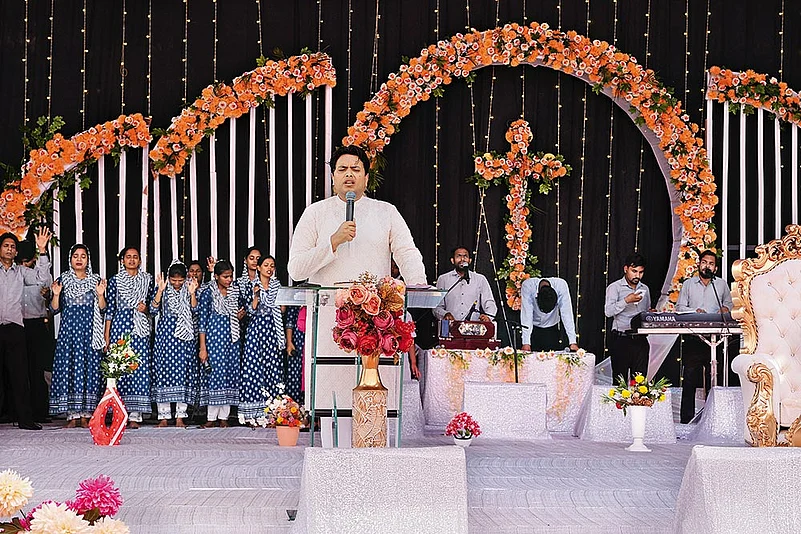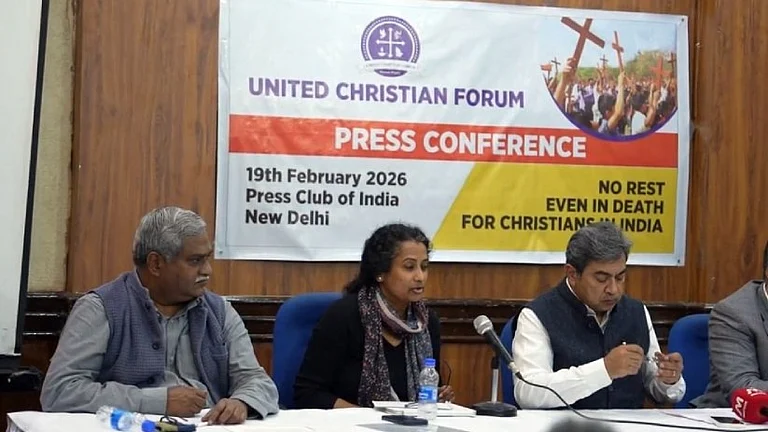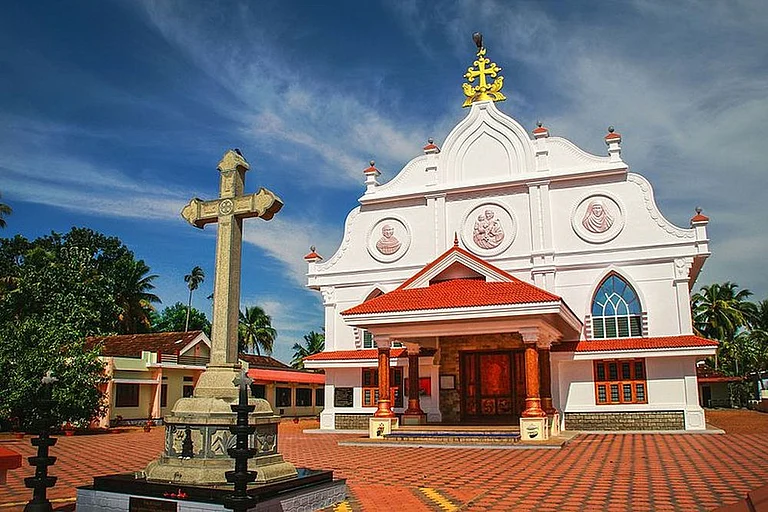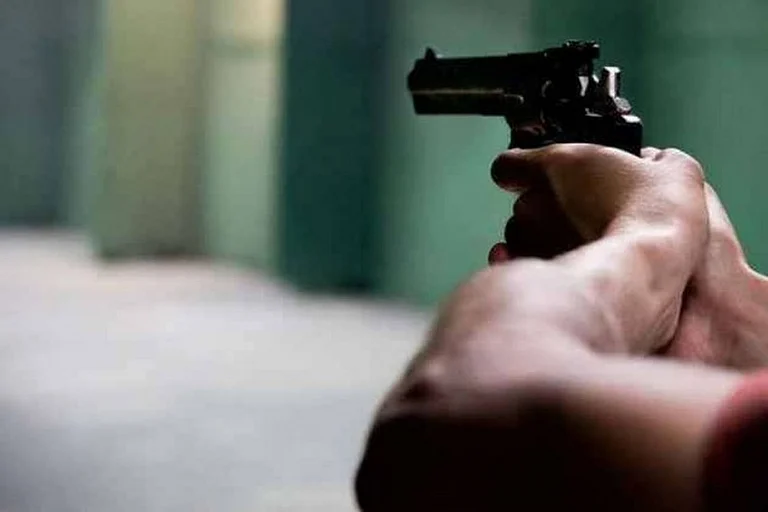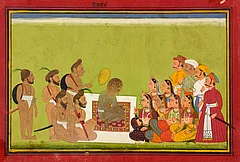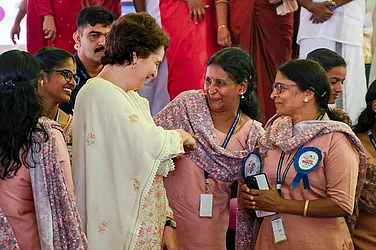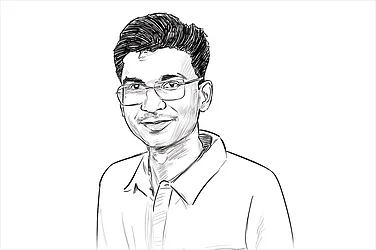It was a regular Sunday morning at Jalandhar, Punjab, but quite an unusual day at Khambra. After sporadic spells of mild rains, on this morning, the sun rose on this quiet village to bustling and vivid scenes. Barely a 23-minute drive from the city, the setting is perfect. An upcoming church—said to be Asia’s biggest and fastest-growing Christian ministry—was immersed in the conspicuous fervour of the devout unlike the ancient churches scattered across Punjab. A large congregation had gathered on the church’s sprawling courtyards. Prayers echoed in the air like a sacred symphony, punctuated by the fervent chants of “Hallelujah, Hallelujah” that rent the air, amplified by giant loudspeakers. The chants kept growing louder in the day. The music blared, its beats syncing with the palpable energy of the crowd of worshippers.
The village located on Nakodar road has a Sikh gurdwara and a temple in the vicinity. But on that day, it looked as if all roads were leading to the Khambra Church that is fast emerging as a beacon of spirited devotion.
Every month, hundreds of people, mostly from the socially and economically weaker sections (Dalits as well as turbaned Sikhs), opt to be baptised at the Church. The ministry also runs an online facility. The ministry’s marriage bureau fixes up matches for Christian couples, even facilitating visas for youths, who are unable to go abroad through private immigration agents.
Spread over an area of 100 acres, this Church of ‘Signs and Wonders’, gained visibility only a few years back with Pastor Ankur Narula, a non-Christian born in a Punjabi Khatri family becoming a central figure. Pastor Narula provides spiritual healing to people through prayers and physical touch. Son of a Jalandhar-based businessman, Jeevan Narula, a.k.a. Ankur (Yoseph) Narula, 40, is a computer engineer, who took to Christianity in 2004. His decision was influenced by a pastor, who helped him to break free from drugs and depression.

Perched on a large stage, a church band reciting songs in praise of Jesus kept asking the devotees to raise their hands in unison, and to take part in prayers with eyes closed. Above the crowd, large video screens and projectors intermittently played testimonies of miraculous healings. The courtyard was packed to capacity—and many were dancing in response to soul-stirring hymns. The atmosphere was electric.
The music stopped when Ankur Narula’s wife—Sonia Yoseph Narula— took the stage and started the sermons. She read out verses from the Bible and exhorted the gathering to follow the Church’s teachings. She stressed that there is no alternative than fully surrendering yourselves to Jesus. “Only He( Jesus) has the power to free you from evil spirits, lingering ailments, drugs, stress and financial problems,” she said.
The Church of ‘signs and wonders’ has followers of all ages and creeds. Many are bound to wheelchairs and ailing. Mothers bring infants with them to seek blessings.
When she was done, she took a back seat. Minutes later Pastor Narula made a dramatic entry as the band played a string of musical compositions. The crowd burst into cheers and people raised their hands to greet “Pappa-ji” (father) as he is fondly called.
The Church has followers of all ages and creeds. Several of them are bound to wheelchairs and ailing. Mothers had brought along toddlers and infants with them to seek blessings. All of them had reached the venue early in the day. They sat under the shade of large make-shift tents pitched overnight to protect them from the heat and the humidity. Hundreds of electric coolers had been installed for their comfort.
Nearly 5,000 volunteers—men and women in white uniforms bearing the ministry’s emblem—bustled about, ensuring every visitor found their place. The white plastic chairs laid out in neat rows next to the stage were reserved for pastors and special attendees. Narula’s father Jeevan Narula, 70, and mother Pushpa, were seated next to the stage.
There were barricaded compartments guarded by stern-faced security personnel conducting checks under the gaze of CCTV cameras. Media was strictly banned. Photography, videography and the use of mobile-phone cameras was not even a remote possibility due to the vigilance of the Church’s multi-layered security ring. The ministry’s ‘CID teams’—mostly volunteers, the metal detectors at the gates, and the thorough screening of every single visitor, especially suspicious elements, showed how Pastor Narula has been successful in building his aura and maintaining control.

As the service commenced, a hush fell over the crowd, broken only by the occasional “Amen’’.
Dressed in white and holding a portable mike, Pastor Narula’s presence and voice stirred the hearts of the ministry’s followers. They stood with clasped hands and eyes closed. Women cried and screamed as a testament to their emotional burdens; pain and ‘evil spirits’ released through their tears and cries as they swayed to the rhythm of music.
Among the crowd was Sandeep Kumar, 40. He belongs to the Dalit community traditionally engaged in leather works. An alcoholic, Kumar says he converted to Christianity some years back. He read a few posters of Pastor Narula and came to know about him performing miracles to cure chronic patients, who turn up at his ministry.
“I gave up alcoholism on day one after arriving at the ministry,” says Kumar. “For almost a decade, I have been travelling by bicycle every Sunday to attend prayers at Khambra. Arya Nagar (Kartarpur) is almost 40 km from Jalandhar. My brothers and their families did not convert to Christianity, neither have they visited the Church. They are educated people, and don’t believe in the Church’s power. It’s their loss, not mine”
There are two other churches—one headed by ‘Prophet’ Bajinder Singh, a Haryanavi Jat, who converted to Christianity. Singh has styled himself as a “miracle healer”. He speaks Punjabi and performs sermons and healings on camera in the presence of larger gatherings during his prayer sessions. He promotes the “Church of Wisdom and Glory”—a Pentecostal church that he set up in 2016.
Nearby, Pastor Harpreet Deol, born into a Jat Sikh family, also runs a huge ministry at village Khojewala. He is involved in ‘miraculous healing’, and has a large following, primarily from the Dalit community and the poorer sections of Punjabi society.
But unlike Pastor Narula and Singh, Deol has inherited the ‘Open-door Church’ from his father, who was also a preacher associated with an Australian pastor. All of them have controversies surrounding their past. Yet, their followers stay loyal and the trend of converting Dalits and Sikhs in rural Punjab is a hard reality now. This makes the majority communities anxious.
There is a lot of buzz about Pastor Narula, whose rise to fame within India and overseas is at an all-time high, and is said to be growing. His large hoardings and banners in towns and on highways overshadow those of politicians and corporate brands. His ministry has a 24X7 TV channel, and uses YouTube and other social media platforms for its outreach. The Church also runs an IAS, IPS coaching college at Khambra.
“We have 125 branches within and outside India. Every Sunday prayer is attended by 1.6 to 1.7 lakh Church followers,” says Jatinder Masih “Gaurav”, his close aide. Masih is quick to deny charges of “forced conversions” in the garb of faith healing. “Everything happens as per the law and with full transparency, “ he says.
According to Tarseem Peter, a Dalit-Christian, who heads the Khet-Mazdoor organisation, there are almost 25 to 26 church ministries working in Jalandhar, Doaba and the Malwa belt of Punjab. They are very different from mainline churches run by missionaries. Most of these have followers among the Dalits, who are attracted to them primarily to seek solace from their problems and ailments. Less religious services, more heroism. “The publicity budget of one ministry in Jalandhar could be larger than that of the Punjab government. Where is this coming from!” he asks.
Just as large sections of Sikhs and (Hindu) Dalits or Dalit-Sikhs have deras in Punjab, the Christian converts, all hailing from upper-caste families, have promoted ministries. At the deras, too, crowds pour in every week to seek relief because of caste discrimination, unemployment, fragmentation of land-holdings, landlessness, medical issues and familial tensions.
Peter says, “Due to social media outreach, money-power, better infrastructure to hold mega prayer sessions and enhanced communication skills, they have become the centres of cult business. The entire crowd from the mainline churches and gurdwaras is going there for quick-fix solutions. It’s also strange that only high-caste converts head the church ministries, not Dalit-Christians.”
Last year the Income Tax Department conducted raids on the premises linked to Pastor Narula and 25 other church ministries in Jalandhar, Amritsar and Gurdaspur districts to probe complaints about foreign funding and donations.
The ministries, linked to Pentecostal churches, also tried to float a political outfit—the United Punjab Party, but later extended support to Aam Admi Party (AAP) candidate Sushil Kumar Rinku. He later joined the Bharatiya Janata Party (BJP), but lost the 2024 Lok Sabha election to Charanjit Singh Channi, former Punjab CM and a Dalit face of the Congress.
Senior officials in the Punjab administration, on the condition of anonymity, maintain that they don’t mess up or interfere in the functioning of the ministries. A few years ago, when one such church was involved in a controversy over the death of a cancer patient to whom they had promised a cure, the police conducted an investigation following a specific complaint. “Everyone is free to profess their religion harmoniously,” says an official.
Bishop Agnelo Rufino Gracias says, “We don’t have any links with such church ministries. We have a glorious history of working in Punjab and never got involved in miracle cures, faith healing and publicity blitz about prayers, etc. It’s up to the authorities to take a call on them. We have dissociated ourselves from them, and conveyed it to the government.”
Sunita Devi from Jharkhand, a regular visitor to the church at Khojewala (Kapurthala), says that she moved to Jalandhar with her husband and son to get her son cured. “My son can’t speak,” says Devi. “We spent a lot of money to get him treated. But finally, we came to the Church. My son and I attend prayers every Sunday. I hope my prayers and the blessings of Jesus will work to make him changa (heal).”
Pastor Surinder Masih of village Balanda, near Nakodar, who converted to Christianity at a young age, says most marginalised groups—both within the Hindu and Sikh communities—suffer from rigid caste structures. In order to live a respectable life, they are giving up their religions voluntarily. It’s also a fact that many Hindu-Dalits convert to Christianity but don’t change their names on paper to continue to enjoy the benefits of Scheduled Caste reservations, he adds. “But I defied this in my case and wrote down my religion as Christian instead of Hindu. My children also followed it.”
The president of the Punjab Christian Movement, Hamid Masih, says that the dominant Hindu and Sikh communities are trying to portray Christians as villains. “It’s because we don’t have a political voice,” he says. Masih denies allegations that missionaries are offering money and using miracle healing to convert people to Christianity. Noted author Suresh Sethi says, “Punjab has seen a prolonged and bad phase of terrorism. But the way things are unfolding there: drugs, migration, conversions and commercialisation of a harmonious society, is a worrying trend”.
It is hard to predict what the future holds for the State, but for now, fervent evangelical activities are turning Jalandhar into the capital of a new ‘religious’ movement.
MORE FROM THIS ISSUE
Ashwani Sharma in Khambra
(This appeared in the print as 'Miracle Ministries')






